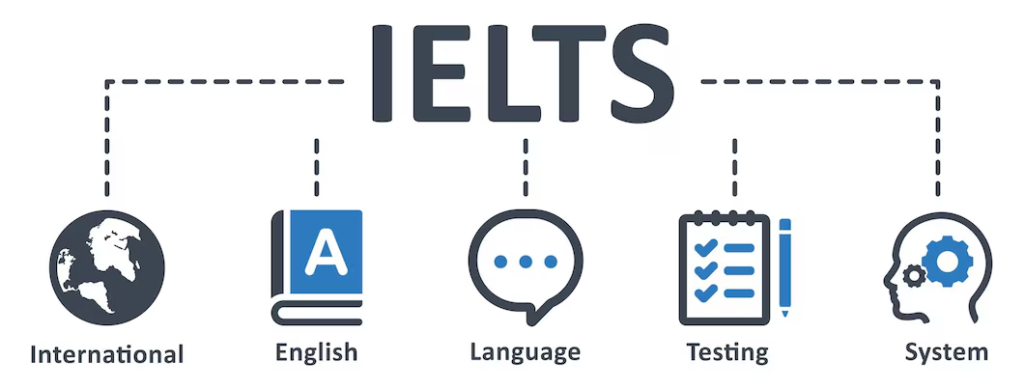Are you planning to study or work abroad? If so, you’ve likely come across the term IELTS. But what exactly is IELTS, and why is it so important for international opportunities? IELTS, which stands for International English Language Testing System, is a widely recognized English language proficiency test. It assesses the language abilities of people who want to study or work in countries where English is the primary language of communication.
The IELTS full form represents a crucial step for many individuals seeking to pursue their academic or professional goals in English-speaking environments. As global mobility increases and English continues to dominate international business and education, the significance of the IELTS full form test has grown exponentially.
What is IELTS Full Form?

IELTS full form is International English Language Testing System. This standardized test was jointly developed by the British Council, IDP: IELTS Australia, and Cambridge Assessment English. The IELTS full form reflects its purpose: to evaluate the English language skills of non-native speakers. Since its introduction in 1989, the IELTS full form has become synonymous with language testing for international education and migration purposes.
The IELTS full form test is designed to assess a candidate’s ability to communicate effectively in English across all four language skills: listening, reading, writing, and speaking. Unlike some other English proficiency tests, IELTS uses a variety of accents and writing styles, making it a comprehensive measure of real-world English language ability. This approach ensures that individuals who achieve high scores on the IELTS full form test are well-prepared to communicate effectively in diverse English-speaking environments.
Types of IELTS Exams

There are two main types of IELTS exams, each designed for different purposes:
| IELTS Exam Type | Purpose | Key Features |
|---|---|---|
| IELTS Academic | For individuals applying to study at undergraduate or postgraduate levels, or for professional registration | Assesses readiness for academic study or training; includes tasks related to academic writing and reading |
| IELTS General Training | For those migrating to English-speaking countries or applying for work experience or training programs | Focuses on basic survival skills in social and workplace contexts; includes more general topics and everyday situations |
Both versions of the IELTS full form test include four sections: Listening, Reading, Writing, and Speaking. The Listening and Speaking sections are the same for both IELTS Academic and General Training, while the Reading and Writing sections differ to suit the specific purposes of each test.
It’s crucial to choose the correct IELTS full form test for your needs. If you’re unsure which version you require, it’s advisable to check with the institution or organization you’re applying to. Some universities or employers may have specific requirements regarding which IELTS full form test they accept.
IELTS Exam Structure

The IELTS full form exam is structured to assess all four language skills comprehensively:
| Section | Duration | Description | Number of Questions |
|---|---|---|---|
| Listening | 30 minutes | 40 questions, four recordings of native English speakers | 40 |
| Reading | 60 minutes | 40 questions, three reading passages with a variety of question types | 40 |
| Writing | 60 minutes | Two tasks (essay and report/letter) | 2 |
| Speaking | 11-14 minutes | Face-to-face interview with an examiner | 3 parts |
The total test time for the IELTS full form exam is 2 hours and 45 minutes. The Speaking test may be taken up to a week before or after the other tests, depending on the test center’s schedule.
In the Listening section of the IELTS full form test, you’ll hear a variety of accents and speaking styles, reflecting the diverse English-speaking world. The Reading section in the Academic version includes texts from books, journals, and newspapers, while the General Training version includes materials you’re likely to encounter in everyday life.
The Writing section for Academic IELTS full form test takers includes describing visual information (such as a graph or chart) and writing an essay. General Training test takers write a letter and an essay. The Speaking section, conducted as a face-to-face interview, assesses your ability to communicate effectively in spoken English across a range of topics.
IELTS Scoring System

The IELTS full form test uses a nine-band scoring system to identify levels of proficiency:
| Band Score | Skill Level | Description |
|---|---|---|
| 9 | Expert User | Full operational command of the language |
| 8 | Very Good User | Fully functional command with only occasional inaccuracies |
| 7 | Good User | Operational command with some inaccuracies |
| 6 | Competent User | Generally effective command with some inaccuracies |
| 5 | Modest User | Partial command with many inaccuracies |
| 4 | Limited User | Basic competence limited to familiar situations |
| 3 | Extremely Limited User | Conveys and understands only general meaning |
| 2 | Intermittent User | Great difficulty in understanding and expressing meaning |
| 1 | Non-User | No ability to use the language beyond a few isolated words |
| 0 | Did not attempt the test | Did not answer the questions |
Each section of the IELTS full form test is scored individually, and then an overall band score is calculated by taking the average of the four section scores. Scores are reported in whole and half bands (e.g., 6.5, 7.0, 7.5).
It’s important to note that different institutions or organizations may have different IELTS full form score requirements. For example, many universities require a minimum overall band score of 6.5 or 7.0 for admission to undergraduate programs, while some postgraduate programs may require higher scores.
Importance of IELTS Scores
IELTS full form scores are crucial for several reasons:
- University Admissions: Many universities in English-speaking countries require IELTS scores as proof of English proficiency. Your IELTS full form score can significantly impact your chances of admission to your desired program.
- Immigration: Countries like Australia, Canada, and the UK often require IELTS scores for visa applications. The score you need can vary depending on the type of visa you’re applying for and the country’s specific requirements.
- Professional Registration: Some professional bodies require IELTS scores for registration or certification. This is particularly common in fields like medicine, nursing, and engineering.
- Employment: Many international companies use IELTS scores to assess the English language skills of potential employees. A good IELTS full form score can give you a competitive edge in the job market.
- Personal Development: Preparing for and taking the IELTS full form test can significantly improve your overall English language skills, benefiting you in various aspects of your personal and professional life.
The IELTS full form test provides a standardized measure of English language proficiency that is recognized globally, making it a valuable credential for international opportunities. Its comprehensive nature ensures that individuals who perform well on the test are capable of communicating effectively in English across various contexts.
Preparation Tips for IELTS

To excel in the IELTS full form test, consider these preparation strategies:
| Preparation Area | Tips |
|---|---|
| Listening | Practice with diverse accents, take notes efficiently, improve concentration |
| Reading | Improve reading speed, practice skimming and scanning, expand vocabulary |
| Writing | Learn essay structures, practice time management, improve grammar and coherence |
| Speaking | Enhance fluency, practice with a study partner, work on pronunciation |
| Overall | Use official IELTS materials, take mock tests, familiarize yourself with question types |
Consistent practice and exposure to English in various contexts are key to improving your performance in the IELTS full form test. Here are some additional tips:
- Immerse yourself in English: Watch English-language movies and TV shows, listen to podcasts, and read English newspapers and books.
- Practice time management: The IELTS full form test is timed, so it’s crucial to practice completing tasks within the given time limits.
- Understand the scoring criteria: Familiarize yourself with how each section is scored to focus your preparation effectively.
- Take practice tests: Regular practice tests will help you become familiar with the format and timing of the IELTS full form test.
- Seek feedback: If possible, have a teacher or native English speaker review your writing and speaking practice to identify areas for improvement.
Remember, preparing for the IELTS full form test is not just about passing an exam; it’s about improving your overall English language skills, which will benefit you in your future academic or professional endeavors.
Common Challenges and How to Overcome Them
Many test-takers face challenges when preparing for the IELTS full form exam:
- Time Management: The IELTS full form test is strictly timed, and many test-takers struggle to complete all sections within the allotted time. Practice with timed mock tests to improve your pacing. Learn to allocate your time wisely across different questions and tasks.
- Vocabulary: A limited vocabulary can hinder performance across all sections of the IELTS full form test. Read widely in English and keep a vocabulary journal. Learn words in context and practice using them in sentences.
- Accent Comprehension: The Listening section features various English accents, which can be challenging for some test-takers. Listen to various English accents through podcasts, news broadcasts, and movies. Familiarize yourself with different pronunciations and speaking styles.
- Writing Skills: Many struggle with the Writing section, particularly in organizing ideas and using appropriate language. Practice writing essays and get feedback from teachers or native speakers. Focus on improving your grammar, coherence, and ability to develop ideas.
- Speaking Confidence: Nervousness can affect performance in the Speaking section. Engage in regular conversations in English and record yourself to identify areas for improvement. Practice speaking on various topics to build confidence and fluency.
- Reading Speed: The Reading section requires quick comprehension of complex texts. Improve your reading speed through regular practice. Learn to quickly identify main ideas and relevant details.
- Lack of Familiarity with Test Format: Not understanding the test format can lead to confusion and lost time during the exam. Thoroughly familiarize yourself with the IELTS full form test format and question types using official IELTS preparation materials.
Remember, overcoming these challenges takes time and consistent effort. The IELTS full form test assesses your overall English language ability, so immerse yourself in the language as much as possible. Regular practice and exposure to English in various contexts will help you improve across all areas of the test.
IELTS Registration and Test Dates
Registering for the IELTS full form test is straightforward:
| Step | Description |
|---|---|
| 1 | Choose IELTS Academic or General Training |
| 2 | Find a test location and date |
| 3 | Create an account on the official IELTS website |
| 4 | Complete the application form |
| 5 | Pay the test fee |
| 6 | Receive confirmation of your test date and location |
IELTS tests are offered up to four times a month in many locations. It’s advisable to register early to secure your preferred test date and location. The availability of test dates can vary depending on your location and the demand for the test. When registering, you’ll need to provide identification documents and may be required to upload a recent photograph. Make sure to double-check all information before submitting your application, as errors could lead to delays or complications on the test day.
The cost of the IELTS full form test varies by country but is generally between $200-$300 USD. Some test centers may offer preparatory courses or materials for an additional fee. Remember to factor in these costs when planning your IELTS journey. After taking the test, you can typically expect to receive your IELTS full form test results within 13 calendar days. Some test centers offer early release of results online, usually within 3-5 days after the test.
Conclusion
In conclusion, understanding the IELTS full form – International English Language Testing System – is crucial for anyone planning to study, work, or live in an English-speaking country. This globally recognized test provides a comprehensive assessment of your English language skills across listening, reading, writing, and speaking. By familiarizing yourself with the test structure, preparing thoroughly, and addressing common challenges, you can maximize your chances of achieving the IELTS score you need.




